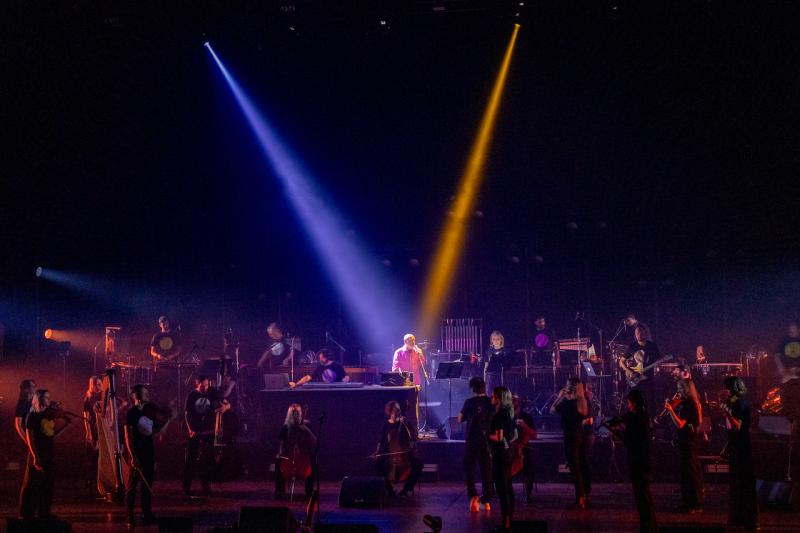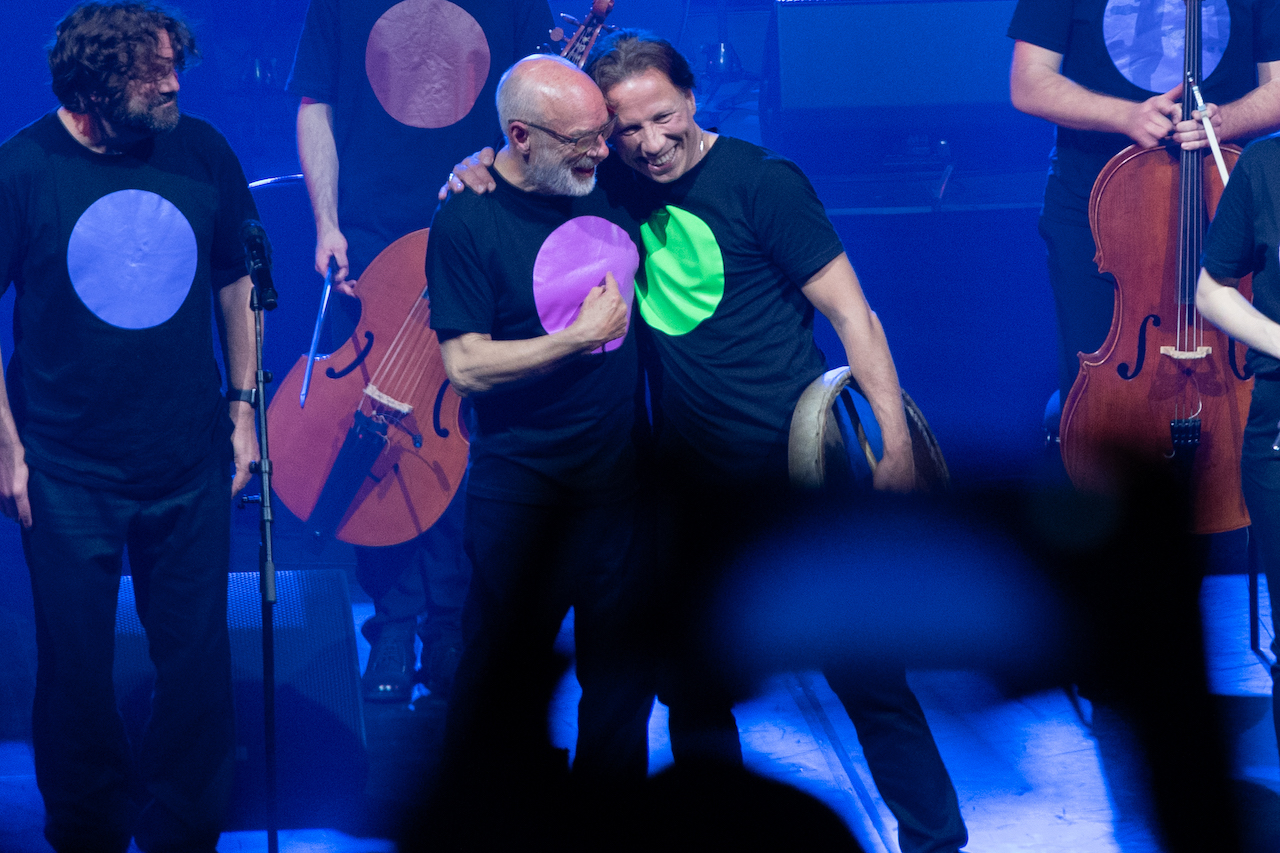Brian Eno, Baltic Sea Philharmonic, Kristjan Järvi, RFH review - electronica brilliantly re-visioned for orchestra | reviews, news & interviews
Brian Eno, Baltic Sea Philharmonic, Kristjan Järvi, RFH review - electronica brilliantly re-visioned for orchestra
Brian Eno, Baltic Sea Philharmonic, Kristjan Järvi, RFH review - electronica brilliantly re-visioned for orchestra
Master of ambient stretches out with cutting-edge orchestra

There is a great deal of sense in transposing electronic music to a symphony orchestra. However beautifully crafted, imaginatively constructed, and creatively programmed, the sounds that come out of synthesisers and other digital tools lack the knife-edge fallibility of music that is produced with the hand or the human breath.
Brian Eno’s concert with the Baltic Sea Philharmonic provides compelling evidence that his compositions reveal more of their essence when taken on a trip into the world of strings, brass and other wind instruments, and the chance-prone reality of human moods and passions.
Brian Eno is one of the very best practitioners of electronica – he's been the gentle spearhead of what has become known as ambient music – but he’s also worked as an acclaimed producer with bands such as U2 and Coldplay, and has indeed collaborated with rock musicians on his own projects (David Byrne and Karl Hyde come to mind). But this is something different. There is plenty of scope for playing with tone, timbre and subtle distortion when working with machine-produced sounds, but the freewheeling and decidedly experimental group of young musicians, directed with a mixture of eccentricity and inspiration by Kristjan Järvi, adds a palette of dimensions that extend the musical universe that is very much Eno’s own.
Since the glamorous days of Roxy Music, Brian Eno has rarely appeared on stage. He recognises, no doubt, that a man in front of an electronic keyboard doesn't provide much of a spectacle. Invited to perform some of his work at the Venice Biennale where he was being awarded a Golden Lion for Lifetime Achievement in Music 2023, Eno asked an executive at Deutsche Grammophon to suggest a few possible orchestras. The Baltic Sea Philharmonic's musicians come from Denmark, Estonia, Finland, Germany, Latvia, Lithuania, Norway, Poland, Russia and Sweden. The Russians did not come to London as their visas were refused. Their founder and leader, Kristjan Järvi (pictured below with Eno), describes the orchestra as “a living breathing creature, with boundless energy and enthusiasm for the new”. They provide a human edge and quality that adds a great desl of value to Eno’s rich an - in their own way - symphonic soundscapes. The violinists, wind and brass stand rather than sit, and they move about the stage, in an improvisatory kind of dance, engaging with each other and coaxed by a leader who infuses the group with energy, rather than holding them in order, as a conventional conductor might do. This is musical democracy at work, rather than a hierarchical set-up, with players lined up with music stands and scores. Järvi, occasionally beating a large frame drum held aloft, as if he were a Sami or Siberian shaman marshalls the spirits present in the collective music-making into the most heartfelt expression.
The violinists, wind and brass stand rather than sit, and they move about the stage, in an improvisatory kind of dance, engaging with each other and coaxed by a leader who infuses the group with energy, rather than holding them in order, as a conventional conductor might do. This is musical democracy at work, rather than a hierarchical set-up, with players lined up with music stands and scores. Järvi, occasionally beating a large frame drum held aloft, as if he were a Sami or Siberian shaman marshalls the spirits present in the collective music-making into the most heartfelt expression.
“Ships”, the opening suite of pieces presented at the Festival Hall, is drawn from Eno’s 2016 album The Ship. Swathes of sound start quietly and grow in intensity. Majestic and gradual rises in volume, as if driven by incremental passion, the heat of emotion contained and drawn out until the boiling point of climax, are very much Eno’s stylistic baseline, just as, for instance, his disciple Jon Hopkins uses deconstructed beats, alternating with moments of serenity, to make music of his own. Until the end of the concert, when older compositions such as “Bone Bomb” – with its references to the suicide bombers of the Second Intifada, and “Making Gardens Out of Silence” are brought to new life in an atmosphere of soulful celebration, Eno’s music is characterised by the absence of a pulse or beat. Starting with his classic ambient album No Pussyfooting, a collaboration with guitarist Robert Fripp, he explored a territory of sounds that float, rise and fall at a pace that's hardly noticeable, as if immobility and repetition were made to connect the listener with essence. “Ships” which starts shrouded in an atmosphere of brooding melancholy, closes with an affirmation of liberated selfhood, the heart-lifting song “Fickle Sun (iii) I’m Set Free”
There's some spoken word from actor Peter Serafinowicz and brooding singing from Melanie Pappenheim. Eno’s own vocals are often treated. This could lead to Vocorder-type excess in which the artificial takes over from the human, and yet he somehow manages to give a touch of grandeur to a voice that’s characterised by a lack of the histrionics so common in rock. There is no pretending here, and the vocal treatments add rather than subtract from the singer’s humanity. For all the anthemic quality of the climaxes that Eno coaxes out of the thickly woven waves of sound rising from the orchestra, there’s an innocence that contrasts with what comes perilously close to the bombastic. It’s a kind of musical diffidence linked perhaps to the quintessentially English quality of his work.
When he speaks to the audience, apologising for a voice slightly diminished by a cold, or speaking of the horrors in Gaza and the Middle East, he does so without the slightest hint of pose. He is visibly stirred. He manages to be himself on stage, one hundred percent. Perhaps this is why he doesn’t make a habit of performing live, as exposing oneself in the way he does, eschewing the personae that make a rock performer’s quasi-priestly role more bearable, is a path fraught with psychological and emotional difficulty. Wisely, in this case, he leaves the front-man’s role to the orchestra and its charismatic conductor Kristjan Järvi. He stands at the rear, albeit sometimes singled out by a powerful spotlight, as a kind of backroom instigator, rather than an inflated ego on parade.
- To coincide with the presentation of “Ships” in concert, the album The Ship (2016) has been re-issued, newly remastered,on clear (coke bottle green) vinyl
- More New Music reviews on theartsdesk
rating
Explore topics
Share this article
more New music
 Album: Justice - Hyperdrama
French electronic dance stalwarts return from eight-year break in fine fettle
Album: Justice - Hyperdrama
French electronic dance stalwarts return from eight-year break in fine fettle
 Album: St Vincent - All Born Screaming
Annie Clark transcends indie’s average leanings
Album: St Vincent - All Born Screaming
Annie Clark transcends indie’s average leanings
 Album: Pet Shop Boys - Nonetheless
Longing, love and longevity as the duo resolutely refuse retirement
Album: Pet Shop Boys - Nonetheless
Longing, love and longevity as the duo resolutely refuse retirement
 Album: Mdou Moctar - Funeral for Justice
Tuareg rockers are on fiery form
Album: Mdou Moctar - Funeral for Justice
Tuareg rockers are on fiery form
 Album: Fred Hersch - Silent, Listening
A 'nocturnal' album - or is it just plain dark?
Album: Fred Hersch - Silent, Listening
A 'nocturnal' album - or is it just plain dark?
 Music Reissues Weekly: Linda Smith - I So Liked Spring, Nothing Else Matters
The reappearance of two obscure - and great - albums by the American musical auteur
Music Reissues Weekly: Linda Smith - I So Liked Spring, Nothing Else Matters
The reappearance of two obscure - and great - albums by the American musical auteur
 The Songs of Joni Mitchell, Roundhouse review - fans (old and new) toast to an icon of our age
A stellar line up of artists reimagine some of Mitchell’s most magnificent works
The Songs of Joni Mitchell, Roundhouse review - fans (old and new) toast to an icon of our age
A stellar line up of artists reimagine some of Mitchell’s most magnificent works
 Album: Taylor Swift - The Tortured Poets Department: The Anthology
Taylor Swift bares her soul with a 31-track double album
Album: Taylor Swift - The Tortured Poets Department: The Anthology
Taylor Swift bares her soul with a 31-track double album
 Album: Jonny Drop • Andrew Ashong - The Puzzle Dust
Bottled sunshine from a Brit soul-jazz team-up
Album: Jonny Drop • Andrew Ashong - The Puzzle Dust
Bottled sunshine from a Brit soul-jazz team-up
 theartsdesk on Vinyl: Record Store Day Special 2024
Annual edition checking out records exclusively available on this year's Record Store Day
theartsdesk on Vinyl: Record Store Day Special 2024
Annual edition checking out records exclusively available on this year's Record Store Day
 Album: Pearl Jam - Dark Matter
Enduring grunge icons return full of energy, arguably their most empowered yet
Album: Pearl Jam - Dark Matter
Enduring grunge icons return full of energy, arguably their most empowered yet
 Album: Paraorchestra with Brett Anderson and Charles Hazlewood - Death Songbook
An uneven voyage into darkness
Album: Paraorchestra with Brett Anderson and Charles Hazlewood - Death Songbook
An uneven voyage into darkness

Add comment